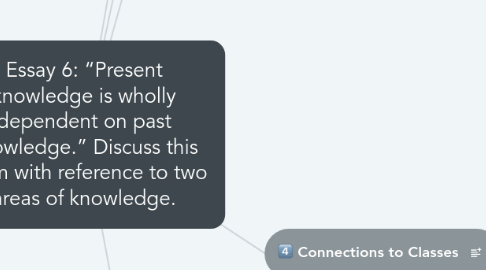
1. Keywords
1.1. define
1.1.1. knowledge
1.1.1.1. dictionary: acquired facts/information/skills; theoretical/understanding of a subject
1.1.2. wholly
1.1.2.1. dictionary: entirely, fully
1.1.2.2. my understanding: totally, 100%, no exception
2. Key Phrases
2.1. rephrase
2.1.1. present knowledge
2.1.1.1. current state of knowledge; what we know now
2.1.2. past knowledge
2.1.2.1. prior knowledge; what we have already known for some time
2.1.3. dependent on
2.1.3.1. determined by
2.1.3.2. rely on (require sb./sth. for support)
3. Rewrite
3.1. 1. All knowledge production of current knowledge requires the support of prior knowledge, including facts, understandings, as well as skills.
3.2. 2. Knowledge production cannot take place if no past experiences are available.
3.3. 3. What we already know is the sole determinant of what we are going to know.
4. Connections to Classes
4.1. Mathematics
4.1.1. AOK: Mathematics
4.1.2. RLE/PK: Mathematical proofs in all fields (arithmetics, geometry, etc.) have a similar logical structure to follow.
4.1.2.1. Connection: Virtually everything I have learnt in maths up to now depends on basic arithmetic calculations and axioms.
4.1.2.1.1. sense perception
4.1.2.1.2. Language & Concepts
4.1.2.2. Connection: Mathematical thinking, such as inductive/deductive reasoning, is crucial for all maths learning.
4.1.2.2.1. reason
4.1.2.2.2. Methodology
4.2. Chemistry
4.2.1. AOK: Natural Sciences
4.2.2. RLE/PK: Chemistry originated from alchemy, a "discipline" in which ancient people tried to turn normal metal into gold.
4.2.2.1. Connection: People's impossible pursuit in the ancient times turned into what we now know as a systematic exploration of the natural world, something immensely different.
4.2.2.1.1. imagination
4.2.2.1.2. Historical Development
4.2.2.2. Connection: The primarily aim of alchemy was to gain wealth; the aims of chemistry include developing clean energy, new medicine, etc.
4.2.2.2.1. reason
4.2.2.2.2. Scope & Application
4.3. Biology
4.3.1. AOK: Natural Sciences
4.3.2. RLE/PK: Biodiversity conservation requires decades of data from observations and experiments.
4.3.2.1. Connection: Conservationists monitor the fluctuations of natural populations in order to perceive correlations and hence reason what factors might be causing dangers to the species.
4.3.2.1.1. sense perception
4.3.2.1.2. methodology
4.3.2.2. Connection: The various forms of life on Earth has long been a wonder as well as treasure for all of us; as a result, the loss of biodiversity prompted the recent rise of conservation biology.
4.3.2.2.1. memory
4.3.2.2.2. Scope & Application
5. Rewrite
5.1. Mathematics: Current knowledge depends considerably on the most basic axioms and theories, but may have different approaches according to specific needs. Since maths is largely invented by people, almost all mathematical theories and methodologies depend on the common mathematical reasoning.
5.2. Natural Sciences: Knowledge production in NS is influenced more by current needs than knowledge production in maths is.
5.2.1. Chemistry: Since many chemical reactions are not directly observable, this discipline is highly theory based. Many falsified past theories act more as inspirations rather than direct support of current knowledge production.
5.2.2. Biology: Much of our biological knowledge (specifically the ecology side) is derived from observable "facts". Because "facts" are not falsifiable (unlike theories), they can always act as evidence for knowledge production.
